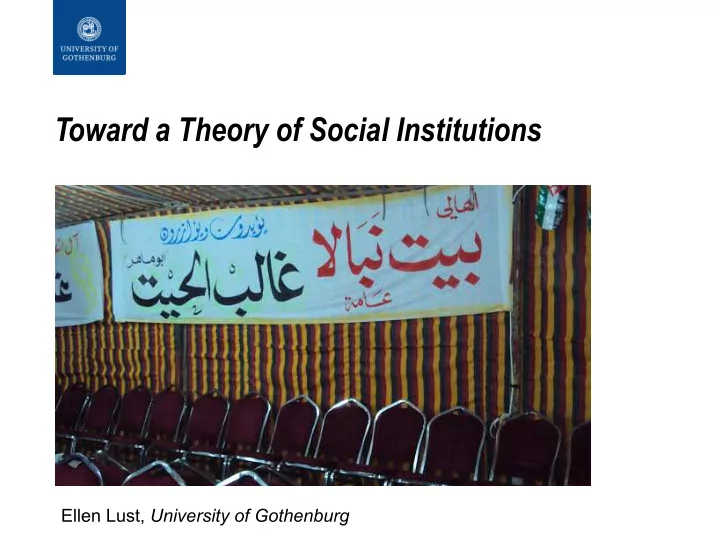

Toward a Theory of Social Institutions Ellen Lust, University of Gothenburg
Goals Ø Provide Framework for Understanding Role of Social Institutions Ø Define Social Institutions (SIs) Ø Distinguish SIs from other Concepts Ø Demonstrate Importance of SIs in PS: Misconceptions and Mispecified Models Ø Challenges in Studying SIs and Potential Solutions
Social Institutions The rules – written or unwritten – that govern social relations within a community, the rewards accorded to observing them and costs of transgression * Cradle to Grave: marry, children reared, resources distributed, security ensured, buried and inheritance * Rules: group boundary maintenance, reciprocity, risk management * Slow-Moving/Sticky
What Social Institutions are Not • Not Organizations • Not Informal Institutions • Not Social Capital or Social Networks • Not Social Composition – ethnicity, urban/rural, etc. • Not Culture – rules vs. preferences
What Social Institutions Do 1. Indirect Influences (examples) Reciprocity, Group Boundaries : Patron-Client relations Homosociality: Gender imbalances in political office holding 2. Direct Incentives (examples) Maintenance of social relations/norms: Voting, Bureaucratic “Corruption”
Why Take Social Institutions Seriously?
Ethnicity and Service Provision: Sub-National Variation in Ethnicization
Elections and Electoral Rules: Distribution of Majoritarian and PR Seats, Libya 17 17 16 16 15 15 14 14 13 12 11 11 10 10 9 9 9 9 8 8 8 7 7 7 7 7 6 6 6 6 5 5 5 5 4 4 3 3 3 3 2 1 0 0 Bayda Tobruk Benghazi Ajdabiya Sirte Sabha Ubari Gharian Misrata Khoms Tripoli Aziziya Zawiya Majoritarian PR
ORGANIZATION NAME (CHANGE HEADER USE THE INSERT TAB-HEADER/FOOTER) Preliminary Framework for Incorporating Social Institutions into Political Science: Ø Differentiated or Uniform Roles and Rules Ø Content of Norms and Rules: reciprocity, risk mitigation, boundary maintenance Ø Overlapping and Segmented Domains/Cleavages: Individuals under multiple SIs (kin, religious, colleagues) Ø Constituencies: SIs in locality: multiple vs. single communities? Ø Strength: density of social ties, connectivity Ø Legitimacy/Consensus: over rule vs. threshold of applicability
Methodological Challenges and Solutions? 1. Challenges: – Disentangling Political and Social Institutions – Determining the Appropriate Level of Analysis – Isolating/Specifying Social Institutions 2. Approach/Solutions: – Arenas of Interest: Gender, Migration, Ethnicity – Determining the Appropriate Level of Analysis
Conclusion Ø Draw attention to Social Institutions, distinct from other concepts Ø Suggest framework for Social Institutions, incorporating some familiar concepts (ex. Networks) Ø Provide Starting Point for Study, Recognizing Methodological Challenges
Recommend
More recommend